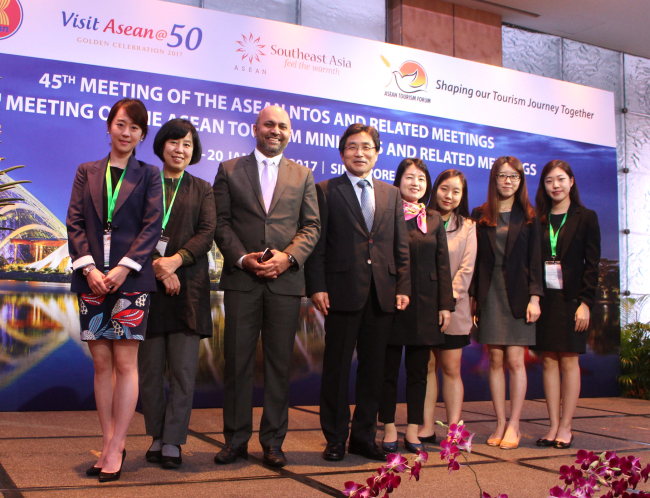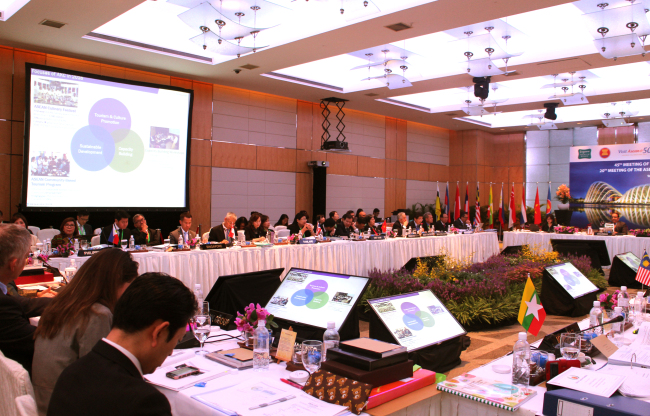ASEAN, Korea hash over tourism, smart city development
By Korea HeraldPublished : Jan. 23, 2017 - 18:12
Marking the 50th anniversary of the Association of Southeast Asian Nations this year, the ASEAN-Korea Center in Seoul sent a mission to Singapore and Indonesia last week to strengthen cooperation in tourism and smart city development.
Under the theme of “Shaping our tourism journey together,” the event in Singapore from Jan. 16 to Friday brought together tourism professionals, ministers and bureaucrats, as well as dialogue partners from Korea, Japan, China and Russia.
Since it was launched in 2009 to foster collaboration between ASEAN and Korea, the public institution has hosted various programs in sustainable development and ecotourism year-round, corresponding to ASEAN’s policy initiatives.
Under the theme of “Shaping our tourism journey together,” the event in Singapore from Jan. 16 to Friday brought together tourism professionals, ministers and bureaucrats, as well as dialogue partners from Korea, Japan, China and Russia.
Since it was launched in 2009 to foster collaboration between ASEAN and Korea, the public institution has hosted various programs in sustainable development and ecotourism year-round, corresponding to ASEAN’s policy initiatives.

This year is also the “ASEAN-Korea cultural exchange year,” with tourism and culinary events scheduled in ASEAN member countries and Korea. According to Kim Young-sun, secretary-general of the center, tourism is playing an instrumental role in strengthening people-to-people exchanges between the two regions, where over 8 million tourists visited last year.
Separate from the tourism event, the delegation toured Bandung and Jakarta, Indonesia, from Jan. 16 to Wednesday, for investment and market research in smart city development. “The fastest growing cities in Indonesia are feeling the strains of rapid population growth and sprawl, which have exacerbated traffic congestion, environmental pollution, housing conditions and other economic activities,” Kim said at the event, which was co-organized with the Indonesia Investment Promotion Center.
“Particularly, there is a growing need for the sustainable development of rapidly expanding middleweight cities. It is therefore vital for us to exchange our know-how and expertise in developing sustainable cities, which are equipped with smart technologies and digital infrastructures.”
The career diplomat was the Korean ambassador to Indonesia from 2011 to 2014.
ASEAN, a rising economic bloc of 625 million people, is expected to grow by at least 16 percent by 2025, according to research, while more than half of Indonesia’s 255 million people will live in cities by 2025, according to the World Bank.

On Jan. 16, the team received briefings on smart city projects and relevant business opportunities in Bandung, southeast of Jakarta in the West Java province. The mission also visited Jababeka, the largest industrial estate in Southeast Asia in the town of Cikarang, West Java province.
Bandung City is the provincial capital and Indonesia’s second-largest metropolitan area with 2.4 million people. The municipal government has concentrated efforts on sustainable urban development, and sent a delegation to Korea for a tour of Sejong City, which was developed as a ubiquitous smart city.
On Jan. 17, the Korean team was briefed on Indonesia’s smart city policies and projects as well as investment incentives during an investment seminar in Jakarta.
An official from the Korea Agency for Infrastructure Technology Advancement shared Korea’s experience in the field, followed by Indonesian provincial officials from East Java, Surabaya and Malang who presented their policies and initiatives. One-on-one meetings between government officials and potential investors representing information communications technology and infrastructure sectors followed.
By Joel Lee (joel@heraldcorp.com)
-
Articles by Korea Herald




![[Herald Interview] 'Amid aging population, Korea to invite more young professionals from overseas'](http://res.heraldm.com/phpwas/restmb_idxmake.php?idx=644&simg=/content/image/2024/04/24/20240424050844_0.jpg&u=20240424200058)















